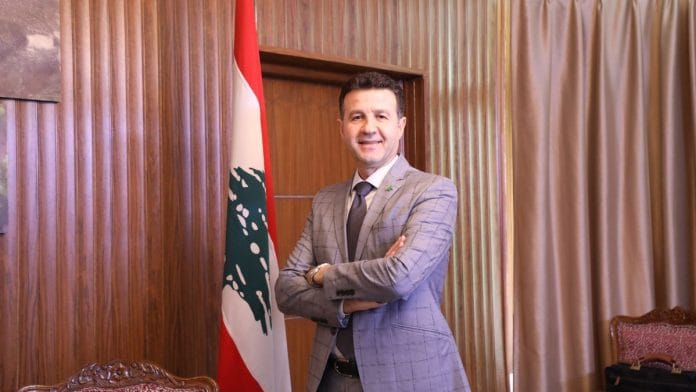New Delhi: Lebanon has called upon India to talk to Israeli Prime Minister Benjamin Netanyahu and his “war-minded” government to deescalate the situation in West Asia, the Lebanese envoy to India Rabie Narsh told ThePrint, while hailing India’s humanitarian assistance of medical supplies to Lebanon.
The Lebanese ambassador defended the right of Hezbollah—the armed Shi’ite militia—to resist against “70 years” of continuous aggression from Israel, especially in this “all-out war” faced by Lebanon.
In an exclusive interview to ThePrint, Narsh said, “Even without asking, India proposed humanitarian aid to Lebanon. Currently, we are preparing for medical supplies to be sent to Lebanon. India is investing in peace and they are playing an important role in de-escalating the situation in West Asia.”
The envoy added, “We encourage them [India], we call upon them to put more efforts, particularly on [Benjamin] Netanyahu and his war-minded government, his racist government to put an end to this devastating war.”
His comments come after over a week of Israel’s incursion into Southern Lebanon, which began in the late hours on 30 September. The United Nations Interim Force in Lebanon (UNIFIL)—the multinational peacekeeping force present in Southern Lebanon—termed Israel’s actions as a “violation” of the West Asian country’s sovereignty and a breach of UN Security Council resolution 1701.
Israel’s actions aimed at Hezbollah have left over 2,000 Lebanese people dead, and laid waste to parts of southern Beirut—the stronghold for the organisation.
Hezbollah, which was founded as a result of Israel’s invasion of Lebanon in 1982, went from being a resistance force to one of the best equipped non-military organisations in the world. Funded by Iran, Hezbollah also entered Lebanese politics and has representation in the nation’s legislature as a political party.
“Hezbollah is Lebanese. Its members are Lebanese. They are a political party. They are represented in the government, in the parliament and in the administration. When it comes to the framework of domestic politics in Lebanon, they function by the established rules of the Lebanese political system,” said Narsh to ThePrint.
The armed militia is recognised as a terrorist organisation by a number of Western countries—the US, UK, Canada, Israel, the European Union and a number of Arab countries. These include member states of the Gulf Cooperation Council—Saudi Arabia, United Arab Emirates, Bahrain, Oman, Qatar and Kuwait.
The Arab League, which had also designated the organisation as a terrorist entity, removed it from its list earlier in 2024.
Also Read: India & Maldives reboot ties, sign currency swap agreements as Muizzu & Modi meet
Hezbollah and Israel
Hezbollah began launching missiles and rockets at Israel on 8 October, 2023 in support of Hamas—the Palestinian military group in control of the Gaza strip. This had occurred a day after attacks by Hamas on Israel that had left nearly 1,200 Israelis dead and 250 people captured as hostages.
In recent weeks, Israel has stepped up its efforts to weaken Hezbollah after fighting the war in Gaza for over a year. In September 2024, thousands of electronic pagers ordered by Hezbollah blew up and left thousands of Lebanese injured. It is widely believed that Israel’s spy agency—Mossad—was behind the attack. Days later, its long-time leader Hassan Nasrallah was killed in an Israeli airstrike on Beirut.
The Lebanese envoy was clear that the death of Nasrallah would not mean the end of “resistance” against Israel.
“Our resistance will keep on going, whether by Hezbollah or other resistance groups. The Lebanese people will not allow our land to be occupied by Israel again,” said Narsh, adding that when it comes to resistance against Tel Aviv, Hezbollah will always be there.
The Lebanese envoy labelled the pager attacks as a “terrorist attack”, given that a number of “nurses, doctors and social workers” were also injured or killed.
UN Security Council Resolution 1701
The Lebanese envoy conceded that some of Hezbollah’s actions in Southern Lebanon had breached the United Nations Security Council (UNSC) resolution 1701, but defended it by pointing out that it was the “right” of the group to “resist”, given that it has come under “attack” everyday by Israel.
UNSC resolution 1701 was passed unanimously in August 2006 to enforce peace at the end of the 2006 war between Hezbollah and Israel. The resolution called for a buffer zone between the Blue Line in the south and the Litani river in the north—a distance of about 20 kilometres, where all armed groups other than the Lebanese army or the UN peacekeeping force, the United Nations Interim Force In Lebanon, were to be disarmed and not allowed to operate.
The Blue Line is the line of withdrawal by Israeli troops in 2000 from Lebanon and Golan Heights, which is acknowledged by the UN as a boundary.
However, Hezbollah continued to operate from within this buffer zone, as noted by the UN Secretary General’s reports on missile launches from the area towards Israel.
“I never said that it [UNSC resolution 1701] was respected from our side—Hezbollah—but when a resolution is breached and you are under attack from a regional superpower, as they claim to be, you have the right to resist. You cannot stay silent, when you are under attack everyday,” said the Lebanese envoy.
Narsh added: “Who started the violation? Who has more power should be held more responsible and this is what the international community says. We always say that the United Nations should have more means to force Israel to abide by all UN resolutions.”
(Edited by Mannat Chugh)
Also Read: Ports, grants, defence to detained fishermen, key takeaways from Jaishankar’s visit to Sri Lanka






